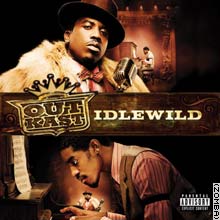
I went to see this a couple of weekends ago and was generally surprised at how well Michael Mann turned the Regan era decadence and gloss of the original into a darker, more filmic monster. To be sure, Mann is the maestro of cool when it comes to the drug/crime/underworld genre with films like
Heat and more recently
Collateral. The subjects of his films are always the most priapic, brooding men surrounded by all of the finest accouterments someone of their level of coolness would naturally have, or failing that, already integrated into the mythology machine of Cool.
Ali and
Heat are fine examples of this. To wit:
Miami Vice is touched with the Mann
imprimatur of coolness in a ways far more cinematic, if not experimentally challenging, than his earlier films. Visually,
Miami Vice is jarringly dissonant while proving consistently engaging.
The opening club scene of Farrell and Foxx surveying a packed dance floor, a Jay-Z/Linkin Park mash-up punctuating the hard and tight shot changes, draws the viewer into the quieted of cacophony. It’s too easy to get lost in the jumble of situations such as these, but Farrell and Foxx cut through the crowd with an eerie stoicism to dispatch of some bad characters. Like the club scenes in
Collateral an austere tone pervades the surface, nearly embedding itself into the content of the scene. The sound and disorder
is the scene and everything else going on -- the breaking of hands, the knocking down of random people -- is simply the medium Mann pushes it through. It’s really difficult to follow, but somehow it all makes sense.
When Farrell and Foxx make their way to the rooftop of the club we get a panoramic cityscape of Miami, thunderbolts trembling and lighting flares igniting. Farrell and Foxx are placed at the bottom centre to bottom right of the shot, never truly its focal point. I want to say this was Mann being unintentional about ontology and simply being inured by the “great shot”, but I’d be hard pressed. I’d suggest that the shot’s ontology (and likely that of the film) is itself. It exist for itself and not the characters, hence the visual marginalization or de-emphasis of Farrell and Foxx. Another interesting aspect of the shot is the grainy patina of the high definition camera, which comes off as chintzy, so much so that it’s nearly boiled down to comic book storyboarding. Yet this is what also places the surrealism onto your lap, so to speak: one can’t help but feel either inside or outside this technical strategy’s conceit. My friend was not willing to commit this and so began rolling his eyes in anticipated exasperation. I, however, was following.
Farrell and Foxx are off to find a wayward friend now. An ingenious Viper camera slides overtop and beside other traffic while following their car. The high definition renders everything anxiously, evoking more a mood than a narrative. And this is the general problem people have with
Miami Vice, that of the narrative being threadbare or virtually non-existent or, worse still, pointless. These, I take it, are backhanded compliments, in a way, since Mann is hardly working for a narrative, not in the least. To rehearse a police procedural of the likes of
Miami Vice would be to revisit all of the torpid clichés and stock gimmicks we typically get from the police/crime procedurals. We saw
Bad Boys 2, we know the deal. Mann, however, has supplied literally no back-story for either of his leads, Crocket and Tubbs, and portrayed their relationship, usually a jocular camaraderie, as distant but not cold.
What follows is an exercise in the inscrutable; we understand nothing deeper or more enlightening about the characters, their development or necessary trajectory leading us nowhere particularly interesting.
The mood
is the subject. The
mise en scene is the mood, and the characters and whatever paltry narrative is offered are not figures standing on top of the
mise en scene but necessarily ground into it. I’m still attempting to unpack my thoughts on all of this, so excuse me if this sounds maddeningly obtuse. But my take is that Mann has created something very evocative and visceral here, something very akin to what Terrence Malick accomplished in
The New World, a film that elicited a similarly appealing if not altogether perplexing set of emotional responses. I can say that I like both. And maybe like isn’t the right word. But I can say that both films were challenging, both intellectually and perceptually.
Not unrelatedly, I read a story of theaters in Japan spraying particular scents during particular scenes in a movie to heighten the realism, like grass when the scene is in a field. The olfactory sense allows the viewer to experience the film at another level. Something like this is going on in
Miami Vice albeit at another, cognitively novel level. Sure it’s a movie you see – but it’s also one that you feel.

